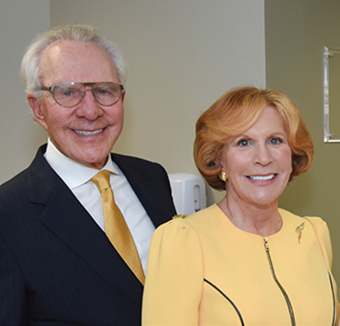Hart $2.5 million gift fuels brain research through clinical trials
By Sharon Reynolds

Milledge A. "Mitch" Hart III and Linda A. Hart
Longtime UTSW supporters Linda A. Hart and Milledge A. “Mitch” Hart III have contributed $2.5 million to accelerate the pace of translating basic discoveries into new clinical trials for patients with cognitive and memory disorders. The ultimate goal of the new Hart Center for Therapeutic Trials for Cognitive and Memory Disorders is to enhance the abilities of physician-scientists at the Peter O’Donnell Jr. Brain Institute to alleviate the burden of cognitive and memory disorders for families everywhere.
“Memory disorders are a major issue that we have to deal with as a nation,” Ms. Hart said. “Our hope is that scientists will develop treatments to delay the onset or slow the progression of these disorders and improve life for millions of Americans. Clinical trial participation is essential to help scientists gain insights about the safety and effectiveness of medical treatments and procedures. Mitch and I are pleased that our gift has the potential to open up clinical trials to more patients and speed up the medical innovation process.”
“UT Southwestern has benefited greatly from the Harts’ passionate support of our mission,” said Dr. Daniel K. Podolsky, President of UT Southwestern. “We are honored to once again be the recipient of their trust and generosity. Their new Center strengthens the infrastructure of the O’Donnell Brain Institute and provides a seamless connection between basic research conducted in our laboratories and patient access to lifesaving clinical trials.”
Work underway at the O’Donnell Brain Institute could significantly advance the understanding of brain disorders and reduce their enormous toll on society. During a clinical trial, the benefits and risks of a potential new drug, treatment, or medical device are carefully monitored. By participating in clinical research, patients help scientists to improve their diagnostic, therapeutic, and preventive options for diseases and conditions and enable the health care breakthroughs of tomorrow. Last year, 2,075 patients were enrolled in 268 active clinical trials at the O’Donnell Brain Institute, and plans are now underway to expand enrollment thanks to support from benefactors like the Harts.
Dr. Brendan Kelley, Vice Chair of Clinical Operations and Associate Professor of Neurology and Neurotherapeutics, oversees the delivery of innovative, effective, and patient-centered neurology clinical services across UTSW’s hospitals and clinics in collaboration with the O’Donnell Brain Institute.
“Clinical trials are critical to medical progress,” Dr. Kelley said. “Our vision is to create a true cognitive and memory disorders research enterprise that offers the option of clinical trial participation to every patient who sees us in the clinic. Some trials will investigate new or innovative medications or interventions that are in the early stages of development and just emerging out of basic science. Others will evaluate the efficacy of compounds in later stages, enabling researchers to understand the best dose of a medicine and its overall effect on the target disease.”
As patients are identified and give consent to participate in clinical studies, their blood samples and brain imaging data will be added to the O’Donnell Brain Institute’s new research database for ongoing analyses. The database will help expand the science and practice of personalized medicine – identifying which patients do better with a specific, individualized treatment.
Dr. Kelley said, “A searchable database will allow us to study and analyze unique clinical and biological aspects of each patient. We can use that knowledge to better understand these diseases, to shape and understand how we can best take care of patients, and to offer research opportunities for those who are interested.”
He is confident that memory disorders like Alzheimer’s will eventually be slowed or prevented, thanks to research and the help of clinical trial volunteers. Together with the Harts’ extraordinary altruistic spirit, these volunteers are bringing hope to patients with cognitive and memory disorders and their families.
Dr. Podolsky holds the Philip O’Bryan Montgomery, Jr., M.D. Distinguished Presidential Chair in Academic Administration, and the Doris and Bryan Wildenthal Distinguished Chair in Medical Science.
Phases of clinical trial research
| |
Typical study group makeup and size |
Average
length
of study |
Purpose |
| Phase 1 |
20-100 healthy volunteers or
people with disease/condition |
A few months |
Test safety, dosage, and tolerability of the drug |
| Phase 2 |
Up to several
hundred people
with disease/condition |
A few months-
2 years
|
Gather drug safety and toxicity data; determine beneficial and adverse effects |
| Phase 3 |
300-3,000 volunteers
with disease/condition |
1-4 years |
Conduct trial across multiple centers; once drug determined safe
and effective, seek FDA approval for human use |
| Phase 4 |
Several thousand volunteers with disease/condition |
Ongoing |
Once FDA approved,
drug released to market; safety surveillance detects rare or long-term adverse side effects |
Source: U.S. Food & Drug Administration